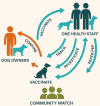Empowering dog owners and One Health teams to eliminate rabies: A community-Led approach from Techiman metropolitan, Ghana
- PMID: 41102832
- PMCID: PMC12533445
- DOI: 10.1186/s42522-025-00164-6
Empowering dog owners and One Health teams to eliminate rabies: A community-Led approach from Techiman metropolitan, Ghana
Abstract
Introduction: Rabies remains a significant public health threat in Ghana, especially in endemic urban areas such as Techiman Metropolitan. This communication highlights the role of empowered dog owners and coordinated One Health actions in eliminating human rabies cases through a community-led intervention model.
Methods: A metropolitan-wide rabies prevention initiative was implemented from 2022 to 2024 under the leadership of the Veterinary Services Directorate. The study area has a population of about 243,335 and an estimated dog population of 8,000. Baseline dog vaccination coverage in 2022 was 31.4%. The intervention engaged dog owners in responsible pet ownership practices, including annual vaccination, confinement, and immediate reporting of dog bites. Simultaneously, the One Health team, comprising veterinary officers, public health workers, and local authorities, coordinated mass dog vaccination campaigns, cross-sectoral surveillance, and ensured timely administration of post-exposure prophylaxis (PEP) through integrated referral systems.
Results: Of the 8,000 estimated dogs, 5,600 (70%) were vaccinated in 2024, compared to 2,355/7,500 (31.4%) in 2021 (χ2 = 1,502.7, p < 0.001). Among vaccinated dogs, 422 (6.0%) had previously bitten humans. Bite reporting increased from 106 cases in 2021 to 180 in 2024 (60.7% increase, χ2 = 15.2, p < 0.001). No human rabies deaths were recorded in 2024, compared to an annual average of six deaths between 2017-2023. These results were achieved through community sensitization, intersectoral collaboration, and the decentralization of vaccination and reporting services.
Discussion: The success of the intervention demonstrates that community empowerment and integration of veterinary and human health services through the One Health model are critical to interrupting rabies transmission. The approach provides a scalable framework for rabies control in other endemic settings, supporting the World Health Organisation's Zero-by-2030 strategy for global rabies elimination.
Keywords: Community engagement; Dog vaccination; Ghana public health; One health approach; Rabies elimination.
© 2025. The Author(s).
Conflict of interest statement
Declarations. Competing interests: The authors declare no competing interests. Institutional review board statement: This study was conducted in accordance with international research guidelines as outlined by the WHO Ethics Review Committee. Although formal ethical approval was not obtained but permission was sought from the Regional Veterinary Officer of Bono East, the Metropolitan Environmental Health Directorate, and the Metropolitan Health Directorate. Informed consent: Informed verbal and written consent was obtained from all participating dog owners, community members, and healthcare personnel involved in the intervention. Participation was entirely voluntary, and no identifiers were collected. All participants were informed of the purpose, process, benefits, and potential risks of the intervention.
Figures
References
-
- Chazya R, Mulenga C, Gibson AD, Lohr F, Boutelle C, Bonaparte S, Waltenburg MA. Rabies vaccinations at the rural–urban divide: successes and barriers to dog rabies vaccination programs from a rural and urban campaign in Zambia. Front Veterinary Sci. 2025. 10.3389/fvets.2024.1492418. - DOI - PMC - PubMed
-
- Disease Investigation Farm. and Regional Veterinary Laboratory Annual Report (2017–2024).
-
- Ghana Health Service. Annual Rabies Report (2024), Techiman South.
LinkOut - more resources
Full Text Sources
Miscellaneous

